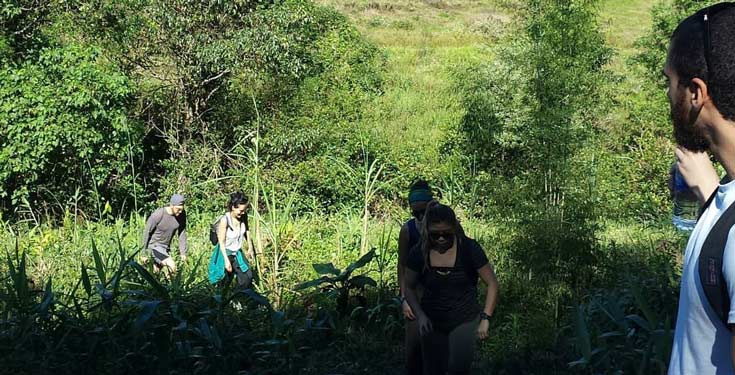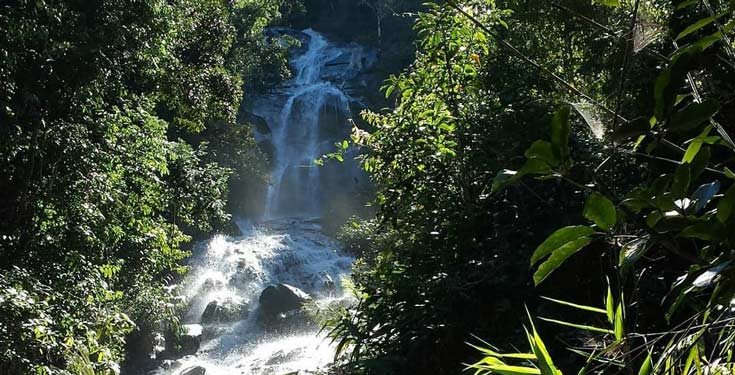Every year NUNM offers several global health trips to different developing nations across the world. Students in the Master of Science in Global Health (MScGH) program must participate in at least one Global Health Experience course, and all NUNM students are welcome to enroll as well. Heather Zwickey, PhD, and trip leader, recounts their time at the Karen Village homestay during the 2018/2019 Global Health Trip in Thailand.
Sawadee kaa (Hello)! Today you find me sitting next to a small waterfall in the mountains of northern Thailand. I’m sitting on a mat on the porch of our bamboo bungalow. We’re doing a Karen Village homestay. Karen is the local tribe.
After a day with elephants at Chai Lai Orchid, we jumped into a 4 wheel-drive songtow and started the journey to the Karen village. We wound up switchbacks and through tall trees. We went down and up dirt roads that should probably only have ATVs on them. Do you want to know how vigorous the ride was? One of our students has an app on her phone and it identified the songtow ride as a new form of exercise. It couldn’t identify what the exercise was, but it knew we got a workout.

We bounced around in the back of this truck for about 1.5 hours, until we arrived here, at the Karen village. But where are we? None of us really know. My phone reception says there’s one bar of service. I can’t bring up Google Maps. What I do know is that it is stunning. We are in the wilderness. Short of a couple of Karen guys who are helping with cooking and guiding, there’s no one around. The electricity is hydroelectric from the river. And it comes on and goes off as it chooses. It’s cold. Really really cold. We’re up in the mountains, so that’s to be expected. But I think none of us really understood how cold it was going to be, so we’ve spent a lot of time next to the fire or cuddling under the blankets in our beds.
The Karen people live on the border with Burma and have been impacted by the Burmese conflict. These are some of the most economically depressed tribes. As a result, the women of these tribes are the most sex trafficked, and that’s one of our topics for this trip. Most often the women are lured to the US or Europe with promise of good jobs, and being able to send money home to their families. When they arrive, they discover that the jobs are sex jobs. Occasionally, they’re sold into sexual slavery by a family member. Some of the women go to Chiang Mai or Bangkok hoping to find work, and wind up becoming prostitutes in these cities.
Education is the antidote to the sex trade for these women. If they can get past 8th grade, they usually won’t wind up in the sex trade. There are a number of non-governmental organizations (NGO’s) and non-profits that are working to educate the girls in these areas. Of course, the other solution is raising men who don’t rely on sexual exploitation of women for their entertainment.

Today the students are hiking to a big waterfall (pictured above by @planted_in_health, student Tami Butterfield). I wasn’t feeling well, so I stayed behind. I think a lot of my issue is lack of protein. When I’m in control of my diet, I eat a lot of meat, fat, and vegetables. Here, I’m eating rice. Noodles and rice. And when things are too spicy, often all I get to eat is rice. So I had rice for dinner. And I had rice for breakfast. And a villager just stopped by on his moped to see if I wanted rice for lunch. Which I don’t. But that’s all they have, so I’ll have rice. Later, we talked to a villager who explained that rice is the ‘rich’ food. So the fact that they’re feeding us rice is actually an honor. I wish my belly agreed.
There’s only a couple of days left on our trip. We’ve had incredible discussions with the students about their culture shock and things they are learning about themselves. Their own personal development and growth has made this trip worth it so far. I’m impressed with this group and their willingness to explore aspects of themselves. I also contribute some this growth to Laura, who is able to ask the right probing questions, has a heart of gold, and is a perfect global health trip leader.
—Heather Zwickey, Adjunct Faculty